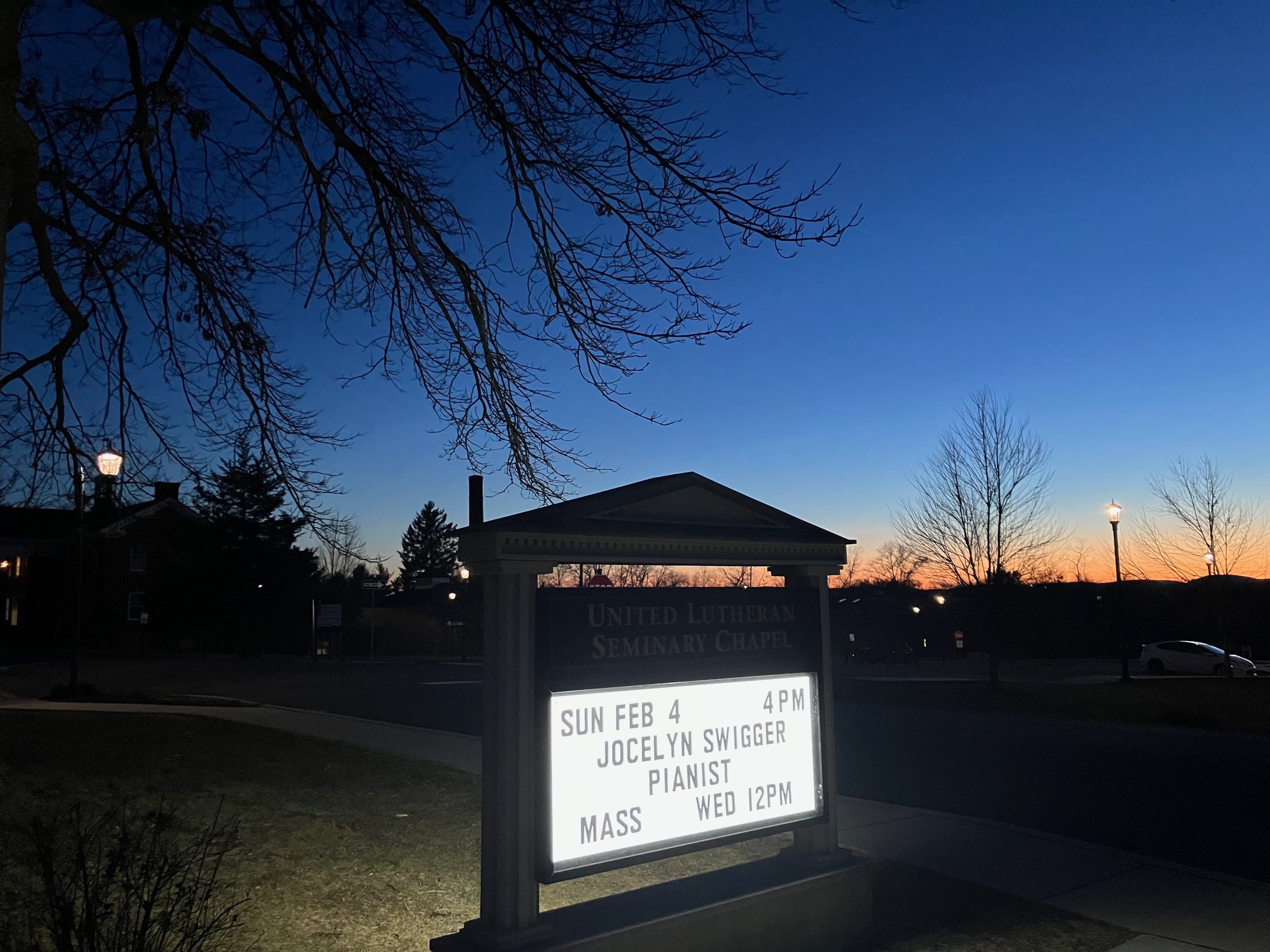I played the Agnes Grand Sonata and the US premiere of six of her concert etudes yesterday afternoon (1,2, 9,10,11, and 8, if you’re counting). It was fun to leave the concert and see my name in lights in front of a beautiful sunset. Then this morning I couldn’t wait to get up and practice them again. This music is so fun. Profound and beautiful, yes, but there’s just so much joy and mirth in it. The audience was great yesterday, and really enjoyed the music; the etudes are crowd-pleasers, and that makes them delightful to play. I played partly really well and partly with some messy moments. That’s standard for a premiere, and I deliberately didn’t record it: I’m being careful about what I release, and I wanted to put my energy towards playing for the audience in front of me, not towards striving for perfection for the forever audience of the recording. It reminded me that performing really is a muscle you have to keep exercising; it was the first formal solo concert I’ve given in several months, and I felt that. In the first few minutes onstage I had to keep putting my attention on feeling the floor and the bench, to literally ground myself. I was almost more nervous about talking than about playing; I came up with my patter, and the story to tell to go with the music, and I think it worked, but I was still tweaking my script right before I started, and I felt nervous about remembering my lines. All opening-night jitters. So I need to play this concert more, and I need to add the other six etudes in.
And I need—deep breath, here—to have the courage to play the music from memory. I’ve been choosing not to, because I want to make the choice that’s about honoring the music, not my own hubris: it’s about Agnes, not me. And being able to turn the pages on the ipad with my face (you GUYS. I can turn the pages with my face. We live in the future.) is a game-changer.
But. Somehow yesterday my contact lenses decided to do gymnastics, or something, and I really truly had trouble seeing the score while I was playing the etudes. So I was glad that I had the pieces mostly memorized! I changed my contact lenses at intermission, and then it was better, but I still had some moments where I just couldn’t see the score as well as I wanted to. I bet I blink less while I’m performing. And I had lots of moments where I just played from memory anyway, because the hands are jumping so much.
So this morning I played through the sonata from memory with only a couple of holes, and played the etudes from yesterday from memory, which I partly can do and partly can’t. So that’s the next goal: learn the rest of the etudes and memorize them, and perform them and the sonata from memory as much as I can. It will feel better to be free from the score.
And I need to play this music more: I need the third and fourth and twelfth performance of this music to play it at my best (I’ve found that with really complicated music I usually like to have about six performances before I really feel like I know what to expect). So I just spent an hour researching retirement homes with pianos within driving distance, and I’m going to arrange to play at as many of them as I can.
Meanwhile, the night before my concert I spent a while rereading the google translate version of Martina Schulmeisterova’s dissertation on Agnes; she kindly let me have the Czech file, so I could translate it and read it. I’m so impressed by how thorough she was, and there were a couple of stories (from obituaries and other contemporary sources) that hadn’t struck me before. One was that someone told a conductor in Vienna at the time, “hey, there’s a young woman in Brno who has written a symphony,” and he laughed, put his hand on the guy’s shoulder, and said “oh, you know I don’t believe in fairy tales.” Another was that apparently Agnes accompanied a violinist in concert when she was 9, playing the Beethoven Spring sonata, and the violinist had a moment where he skipped a measure. Agnes did what all heroic and quick-thinking collaborative players do: she skipped a measure too so the ensemble didn’t fall apart. Someone who knew the piece clearly noticed, though, and was really impressed. That’s pretty amazing if she could do that when she was nine. It might not be true, of course…but it’s a good story.
The concert was in a church, so when I was off “stage” in the sacristy I appreciated reading the stained glass window that said: “O Lord God, I am indeed unworthy of the office and ministry to make known thy glory, to serve this congregation. But the people are in need. Grant me a right understanding of thy word and send thy holy spirit that he may work with me. Amen.” I felt that, I feel that, with Agnes, and I said a sort of agnostic prayer about that. We need, the people need, music that is fun and beautiful, and I hope for a right understanding.
My ridiculously kind friend Natalie left me a home-cooked dinner and a Guinness on my porch for after the concert, and I felt very happy eating chicken and mashed potatoes and broccoli and chocolates. I feel lucky that I got to play this music, that I get to play this music. I want to play it again, again, again.


